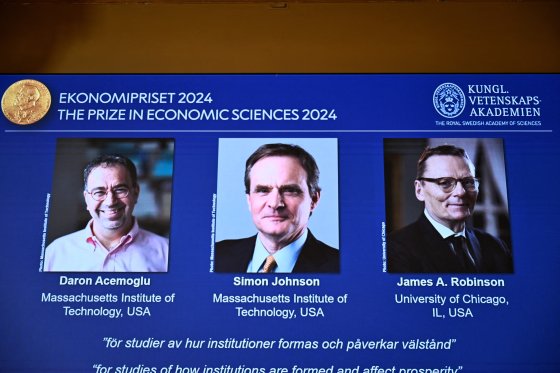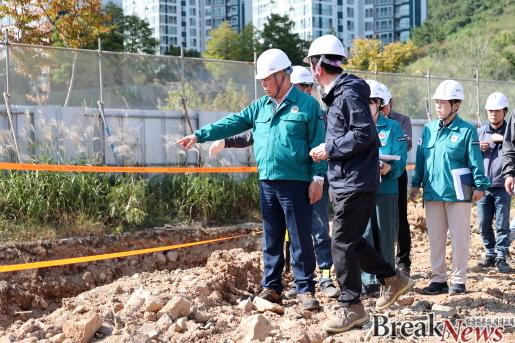Simon Johnson of the Massachusetts Institute of Technology (MIT), co-winner of the Nobel Prize in Economics, poses at his home in Washington on the 14th (local time). AP = Yonhap News” data-type=”article”/>
Professor Simon Johnson of the Massachusetts Institute of Technology (MIT), co-winner of the Nobel Prize in Economics, poses at his home in Washington on the 14th (local time). AP = Yonhap News
“When we build inclusive institutions, we can achieve stronger, stronger and more sustainable economic growth. “Korea’s example of achieving the most amazing economic success in world history is the direction that countries around the world should pursue.”
Simon Johnson (61), a professor at the Massachusetts Institute of Technology (MIT) and one of this year’s co-recipients of the Nobel Prize in Economics, said in a phone interview with the JoongAng Ilbo on the 14th (local time), “Korea has achieved remarkable economic achievements based on an inclusive system. “It’s a great example,” he said.
Professor Johnson, Daron Ajemoglu (57), professor of economics at MIT, and James Robinson (64), professor of political science at the University of Chicago, were selected as joint winners of the Nobel Prize in Economics for their research on the impact of social institutions on national prosperity. They focused on the fact that the key to distinguishing rich countries from poor countries is ‘social system’, and believed that economic growth and national prosperity are achieved especially in countries that have established ‘inclusive systems’. As an opposite concept, he proposed an ‘exploitative system’ in which wealth and power are concentrated in the hands of a few. One of the topics of their research is that although they had the same ethnic and geographic conditions, the results were different as South Korea built an inclusive system and North Korea built an exploitative system.
Professor Johnson said in an interview, “Compared to many other countries that were poor in 1960, Korea’s achievements are quite surprising and very impressive. What is clear is that Korea’s success is a very important success story based on an inclusive system.” However, he pointed out the “population problem caused by low birth rate and aging population” as a mid- to long-term task that Korea must solve. He also emphasized ‘entrepreneurship’ by giving advice, saying, “We have already achieved a lot, but if Korea is to survive for a long time and prosper in the global economy, we must be very open and flexible.”
He said, “It is very positive that Korean culture, such as K-pop and K-drama, is rising to the global forefront,” and added, “Many Korean creators are delivering messages that the whole world can relate to, and are becoming a source of successful economic activities.” He said, “I see creativity and innovation in Korean culture. However, he emphasized that an organizational culture of broad motivation and innovation is needed not only in the field of culture and arts but also in the corporate field.
Among the three co-recipients, Professor Johnson is a member of the ‘Korean Wave’ who is particularly close to Korea. His wife is of Korean descent, and he worked in Korea from 1997 to 1998, and the relationship is deep, as he participated in many Korea-related projects. Regarding the news of novelist Han Kang winning the Nobel Prize in Literature, Professor Johnson said, “I am well aware of it. “I haven’t read the novel, but I definitely want to read it when I have time,” he said. “It looks very, very, very interesting.” He said his favorite Korean food is bibimbap.

This year’s joint winners of the Nobel Prize in Economics are shown on the screen at a press conference held at the Royal Swedish Academy of Sciences in Stockholm, Sweden on the 14th (local time). From the left of the screen, co-recipients of the Nobel Prize in Economics include Daron Azemoglu, professor of economics at the Massachusetts Institute of Technology (MIT), Simon Johnson, professor at the MIT Sloan School of Management, and James Robinson, professor of political science at the University of Chicago. AP = Yonhap News
How can you explain Korea’s economic development? “We focus on social systems as a key factor in determining the success or failure of a country, and call the system that guarantees property rights for the majority of the public and creates a fair playing field an ‘inclusive system.’ , a non-democratic form in which power and property are concentrated in only a few people was classified as an ‘exploitative system’. “Korea is a very important study case that achieved tremendous economic growth based on an inclusive system.” If you could explain in more detail the inclusive system in Korea’s success, it would be: “It is the establishment of democracy. Korea has been struggling for decades for its current democracy. Of course, it wasn’t easy, but I know that we have now built a fairly solid and powerful democracy that provides more opportunities for the people.” “Before the Korean War, much of the industrial infrastructure was located in the North. However, in complete contrast to South Korea, North Korea has adopted an extremely totalitarian state system in which a small number of people have all power and economic opportunities. “South Korea and North Korea are of the same ethnicity and have the same geographical conditions and culture, but as a result of establishing different systems, the economic gap has now widened more than 10 times.” What is your outlook on the low birth rate and aging problem that Korea is experiencing? “Population decline due to low birth rate will cause very special difficulties not only for the Korean economy but also for all countries. It is not a problem that can be easily solved. There may not be a magic wand, but considering that Korea has overcome many difficulties so far, I think this problem will also be resolved well.” The export-driven Korean economy is greatly influenced by the international situation. What advice would you give to the Korean economy? “The entrepreneurial spirit needs to be more active. Korea has led an export-oriented economy centered on a small number of large corporations, which was an efficient method for compressed growth in a short period of time, but there were also negative aspects such as sacrificing fair competition. The important thing is that competition must be free. And there should be more opportunities for young people to do their own work. The Korean economy has already achieved remarkable results, but it must remain very open to survive and further prosper in the global economy. We need to communicate with the whole world and be flexible. If young people want to start a business, they should be able to do so freely.” In an interview with Reuters, he said there was great concern that if former President Donald Trump loses the presidential election, he may object to the results. “I think it is very important to respect the rules of the game in an intellectual democracy. Looking at historical examples, those in power who challenged democracy and election methods ultimately damaged the country and system. Former President Trump does not even accept the results of the 2020 presidential election, in which he clearly lost. Inciting the storming of the Capitol on January 6, 2021 is absolutely reprehensible. He is already largely responsible for undermining democracy, but the problem is that it could get much worse in the future. “This is a very serious and dangerous thing.” I heard that you have a deep connection to Korea. “My wife’s parents were born in Korea. Much of my work has been about countries that have developed in recent decades and the strategies they have used. So I was very interested in the achievements that Korea has made over the past few decades. There were many times when I conducted research myself or helped with Korea-related research projects. “I also eat Korean food very well, but I like bibimbap the most.” Do you know about novelist Han Kang’s Nobel Prize in Literature? “Of course. I haven’t read her work yet, but I definitely want to when I have time. “It looks very, very interesting.”
Washington = Correspondent Kim Hyeong-gu [email protected]

